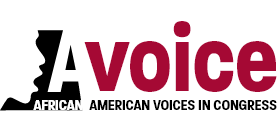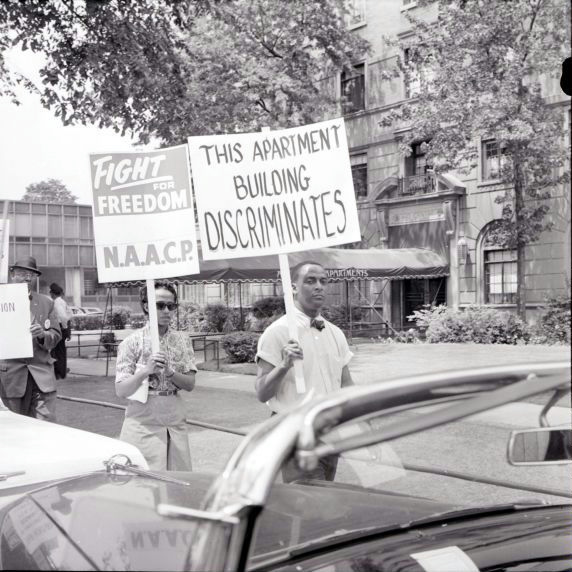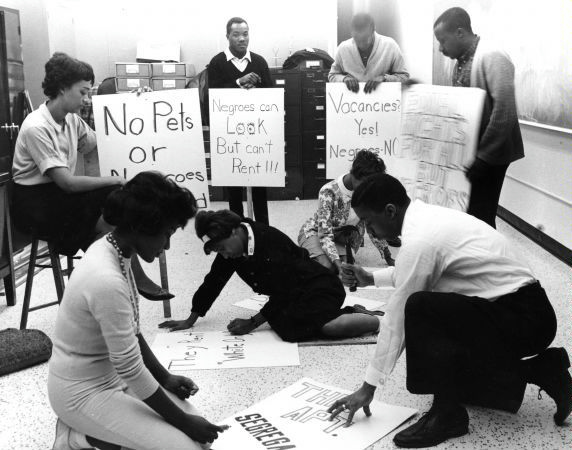Fair Housing: Vocabulary
Learn about the leadership of African-American legislators in the struggle to pass the Fair Housing Act of 1968 and the continuing effort to eradicate discriminatory housing policies and practices.

Adjustable Rate Mortgage – a mortgage with an interest rate and monthly payment that periodically move either up or down to reflect changes in market interest rates.
Balloon loan or mortgage – a mortgage that typically offers low rates for a set period of time (usually 5, 7, or 10 years) and then requires the borrower to either pay the rest of the loan in one payment or to refinance the mortgage. The final, large payment of such a loan is known as a balloon payment.
Administrative Law Judge (ALJ) – an official hired by an agency to hear and decide cases. Under fair housing law, ALJs can decide a discrimination complaint is valid and, if so, the remedy that should be imposed. HUD ALJs are empowered to award damages and impose civil penalties if they find the Fair Housing Act has been violated.
Conciliation – the attempt to resolve a dispute or complaint by bringing the complainant and respondent together with a neutral third-party to negotiate a voluntary settlement.
Complainant – a person or group who files a charge or makes a complaint.
Familial Status – having a child under 18 as part of a household. This includes children living with a parent, legal guardian, or their designee. It also includes a woman who is pregnant, and people in the process of adopting or gaining custody of a child/children.
Foreclosure – a legal process in which a lender repossesses a mortgaged property after a borrower defaults, or fails to make payments, on the mortgage. The lender then sells the property to clear the mortgage debt.
Moratorium – a legally authorized period of delay or suspension.
Mortgage – a loan to finance the purchase of real estate in which the borrower gives the lender the right to foreclose on the property if the borrower fails to pay.
“Mrs. Murphy” Exemption – exempts dwellings with four or fewer units from the discriminatory prohibitions included in the Fair Housing Act as long as the owner of the building lives in one of the units and does not use the services of a real estate agent.
Prime Mortgage – a mortgage made to borrowers with very good credit.
Prepayment penalty – a fee charged by a lender when a borrower pays a mortgage off early or before all payments are due.
Predatory Lending – a term referring to a variety of lending practices that strip wealth or income from borrowers through deceptive or unfair loan terms or marketing practices. Predatory loans typically are much more expensive than justified by the risk associated with the loan. Characteristics of predatory loans may include, but are not limited to, excessive or hidden fees, high interest rates, terms designed to trap borrowers in debt, a failure to take into account a borrower’s ability to repay the loan, and targeting women, minorities, and communities of color for loans in violation of fair lending laws.
Redlining – practice of denying or restricting the number of loans available to specific neighborhoods based on the ethnicity, race, location, or other characteristic instead of an individual applicant’s qualifications.
Racially Restrictive Covenant – a contractual agreement among property owners, often in a property deed, to prohibit the purchase, lease, or occupation of a piece of property by a particular group of people because of their race. In 1948, the Supreme Court declared racially restrictive covenants unenforceable in its Shelly v. Kramer ruling.
Reverse redlining – the practice of targeting certain borrowers or areas with less advantageous loan products or services based on the ethnicity, race, or other characteristics.
Securitization – the practice of bringing together many loans, such as mortgages, and selling to investors the rights to receive the future payments made on those loans.
Source of income – the source from which a tenant or home loan borrower receives legal, verifiable income used to pay for housing. This can include but is not limited to, housing vouchers, Social Security, Supplemental Security Income, unemployment insurance, veteran’s benefits, or other government assistance.
Steering (lending) – the practice of encouraging a borrower to accept a higher-cost subprime loan even when they qualify for a more affordable prime loan.
Steering (real estate) – the practice in real estate of influencing a buyer’s choice of residence or community based upon one of the protected characteristics under the Fair Housing Act.
Subprime mortgage – a type of mortgage intended to serve borrowers who do not qualify for prime loans because of credit problems or limited credit history. Lenders often charge higher interest rates on subprime mortgages than on prime mortgages because borrowers with lower credit scores are seen as higher risk. Though not all subprime lending is predatory lending, virtually all predatory mortgages are subprime loans.
Testing – a technique for identifying discrimination by using pairs of trained individuals or “testers” who are substantially similar to each other except that one identifies with one of the classes protected under the Fair Housing Act. A minority tester and a White tester, for example, pose as home seekers and approach the same landlord, seller, or other housing agent to evaluate if the agent maintains discriminatory policies or engages in discriminatory treatment.
Zoning Laws – local laws established to control the use of land within specific areas. Zoning laws are used to separate residential land from areas of non-residential use. Zoning ordinances include provisions governing such things as type of structure, lot size, and uses of a building. The Fair Housing Act prohibits local government from using zoning in a way that excludes or otherwise discriminates against any groups protected under the Act.




